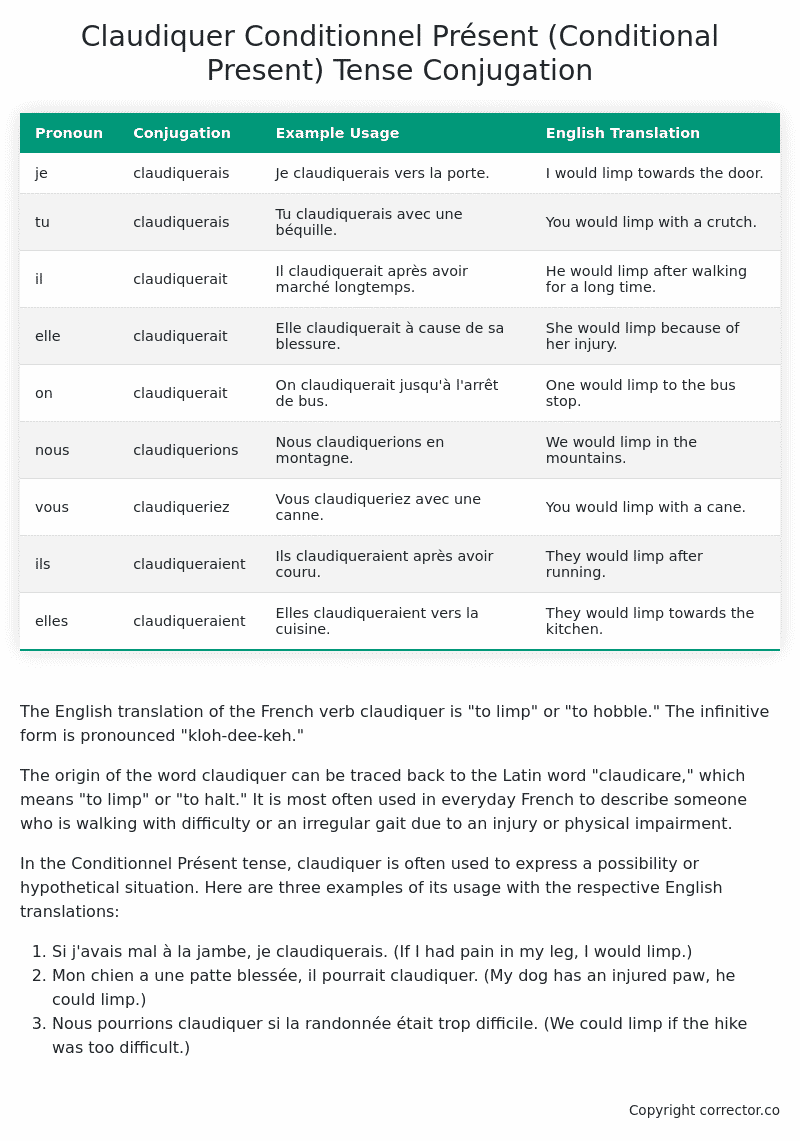Conditionnel Présent (Conditional Present) Tense Conjugation of the French Verb claudiquer
Introduction to the verb claudiquer
The English translation of the French verb claudiquer is “to limp” or “to hobble.” The infinitive form is pronounced “kloh-dee-keh.”
The origin of the word claudiquer can be traced back to the Latin word “claudicare,” which means “to limp” or “to halt.” It is most often used in everyday French to describe someone who is walking with difficulty or an irregular gait due to an injury or physical impairment.
In the Conditionnel Présent tense, claudiquer is often used to express a possibility or hypothetical situation. Here are three examples of its usage with the respective English translations:
- Si j’avais mal à la jambe, je claudiquerais. (If I had pain in my leg, I would limp.)
- Mon chien a une patte blessée, il pourrait claudiquer. (My dog has an injured paw, he could limp.)
- Nous pourrions claudiquer si la randonnée était trop difficile. (We could limp if the hike was too difficult.)
Table of the Conditionnel Présent (Conditional Present) Tense Conjugation of claudiquer
| Pronoun | Conjugation | Example Usage | English Translation |
|---|---|---|---|
| je | claudiquerais | Je claudiquerais vers la porte. | I would limp towards the door. |
| tu | claudiquerais | Tu claudiquerais avec une béquille. | You would limp with a crutch. |
| il | claudiquerait | Il claudiquerait après avoir marché longtemps. | He would limp after walking for a long time. |
| elle | claudiquerait | Elle claudiquerait à cause de sa blessure. | She would limp because of her injury. |
| on | claudiquerait | On claudiquerait jusqu’à l’arrêt de bus. | One would limp to the bus stop. |
| nous | claudiquerions | Nous claudiquerions en montagne. | We would limp in the mountains. |
| vous | claudiqueriez | Vous claudiqueriez avec une canne. | You would limp with a cane. |
| ils | claudiqueraient | Ils claudiqueraient après avoir couru. | They would limp after running. |
| elles | claudiqueraient | Elles claudiqueraient vers la cuisine. | They would limp towards the kitchen. |
Other Conjugations for Claudiquer.
Le Present (Present Tense) Conjugation of the French Verb claudiquer
Imparfait (Imperfect) Tense Conjugation of the French Verb claudiquer
Passé Simple (Simple Past) Tense Conjugation of the French Verb claudiquer
Passé Composé (Present Perfect) Tense Conjugation of the French Verb claudiquer
Futur Simple (Simple Future) Tense Conjugation of the French Verb claudiquer
Futur Proche (Near Future) Tense Conjugation of the French Verb claudiquer
Plus-que-parfait (Pluperfect) Tense Conjugation of the French Verb claudiquer
Passé Antérieur (Past Anterior) Tense Conjugation of the French Verb claudiquer
Futur Antérieur (Future Anterior) Tense Conjugation of the French Verb claudiquer
Subjonctif Présent (Subjunctive Present) Tense Conjugation of the French Verb claudiquer
Subjonctif Passé (Subjunctive Past) Tense Conjugation of the French Verb claudiquer
Subjonctif Imparfait (Subjunctive Imperfect) Tense Conjugation of the French Verb claudiquer
Subjonctif Plus-que-parfait (Subjunctive Pluperfect) Tense Conjugation of the French Verb claudiquer
Conditionnel Présent (Conditional Present) Tense Conjugation of the French Verb claudiquer (this article)
Conditionnel Passé (Conditional Past) Tense Conjugation of the French Verb claudiquer
L’impératif Présent (Imperative Present) Tense Conjugation of the French Verb claudiquer
L’infinitif Présent (Infinitive Present) Tense Conjugation of the French Verb claudiquer
Struggling with French verbs or the language in general? Why not use our free French Grammar Checker – no registration required!
Get a FREE Download Study Sheet of this Conjugation 🔥
Simply right click the image below, click “save image” and get your free reference for the claudiquer Conditionnel Présent tense conjugation!

Claudiquer – About the French Conditionnel Présent (Conditional Present) Tense
Formation
Common Everyday Usage Patterns
Expressing Polite Requests
Expressing Hypothetical Situations
Expressing Doubt or Uncertainty
Interactions with Other Tenses
Present Tense
Past Tense
Future Tense
Conditional Perfect
Summary
Want More?
I hope you enjoyed this article on the verb claudiquer. Still in a learning mood? Check out another TOTALLY random French verb conjugation!


